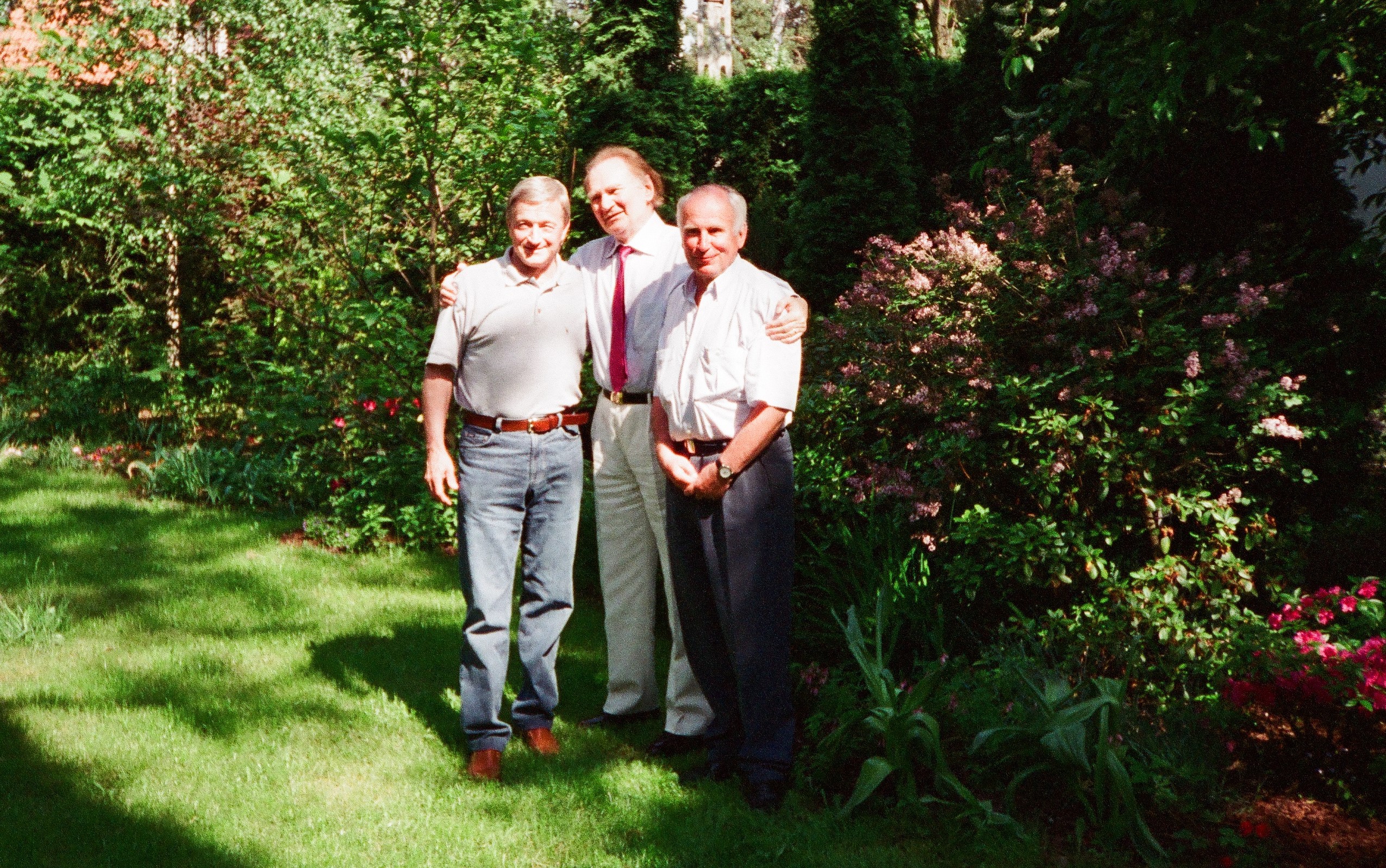Jerzy Semkow (1928–2014)
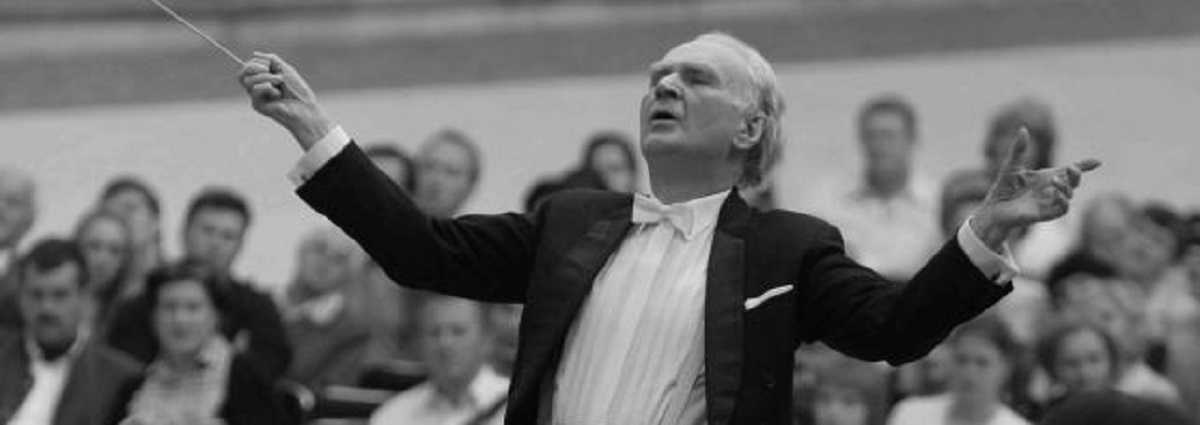
He was one of those figures who constituted the most noble face of Polish musical culture – an ideal of an artist and a conductor who exuded the mystical aura of great art and personality around himself. It was a great gift which everyone around him could feel. Both orchestras, and the audience. He had a huge unquestionable authority. That was the authority of a truly great master – great in his talent and achievements.
Jerzy Semkow produced a visionary idea: to establish an orchestra for talented youth in Poland – the Polish Sinfonia Iuventus Orchestra. He was our “founding father” and a true guardian spirit for the first years.
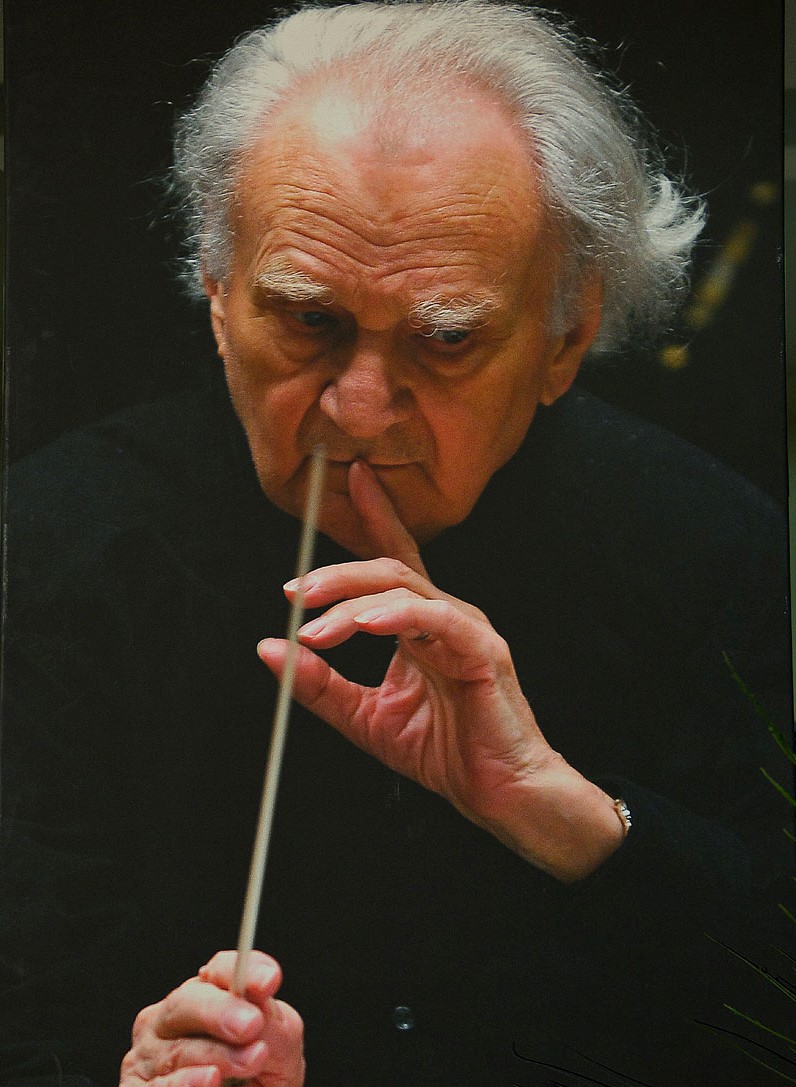
phot. Mirosław Kercz
In October 2006 students and graduates of the Fryderyk Chopin Academy of Music in Warsaw, under the baton of Jerzy Semkow, performed Anton Bruckner’s Symphony No. 7 in an extremely sublime style. Subsequently, Maestro addressed the authorities of the Ministry of Culture and National Heritage to provide the most talented young musicians with special support and create an institution where they could continue honing their talents and make a professional debut. It was with them in mind that the Polish Sinfonia Iuventus Orchestra was established by order of the Minister for Culture and National Heritage of 28 September 2007, created to bring together the most talented graduates of music universities in Poland.
This is how Maestro himself described this idea when rehearsing and performing with the band: “It is designed in such a way to give Polish (and not only Polish) orchestras the opportunity to employ people who are already entirely familiar with issues related to symphonic music and thus prepared to move on. This is the most beautiful and noble idea of all, to give our young musicians, our young artists a chance to stay on the Vistula River, instead of going to Guadalajara to find opportunities not only to play, but simply – to earn their bread. All over the world, young people who devote themselves to music sooner or later realise that this is a terribly difficult job, from childhood to complete maturity. I would like to see this orchestra gradually acquiring the whole of the world’s great repertoire, and it will do so, it will much faster than it seems. They are talented, receptive, they want to work and show that they are trustworthy”.
We truly believe that this orchestra will always be a living embodiment of his ideals!
The master-student relationship is important in all fields of art. In musical art, however, it is special and long-lasting. Maestro Jerzy Semkow knew that perfectly well and although he was a very busy kapellmeister, constantly invited to work on the most important stages on the globe, he always strived to find time to work with young people, share his knowledge, experience and charisma. He realised how important and critical the contact with recognised authorities was for them.
In December 2008 in Bydgoszcz (after an intensive summer workshop in Radziejowice), Jerzy Semkow and POSI recorded their debut album containing two of Schubert’s symphonies (CD Accord ACD146-2), which was very well received by critics (“Schubert’s symphonies played under Semkow’s skilful baton […] are incredibly pleasing to listen to. The symphonies – especially the Fifth, in B flat major – erupt with youth, freshness and joyful exuberance” – from a review by Jacek Hawryluk).
In March the following year Jerzy Semkow conducted Sinfonia Iuventus during a concert at the Polish Baltic Philharmonic in Gdańsk, with a programme containing music by Schubert and Chopin. Half a year later, in October 2009, another wonderful album was produced, with Symphony No. 5 by Tchaikovsky (CD Accord ACD164-2), whose music belonged to the great conductor’s artistic emploi. On 21 February 2010, the ensemble performed under his baton at the Grand Theatre in Warsaw, while on 18 June this year the orchestra together with their unforgettable mentor gave a concert in UNESCO Auditorium in Paris. They presented the programme previously played in Warsaw, namely Chopin’s Concerto in E Minor (François-René Duchâble) and Schubert’s Symphony in C Major (The Great).
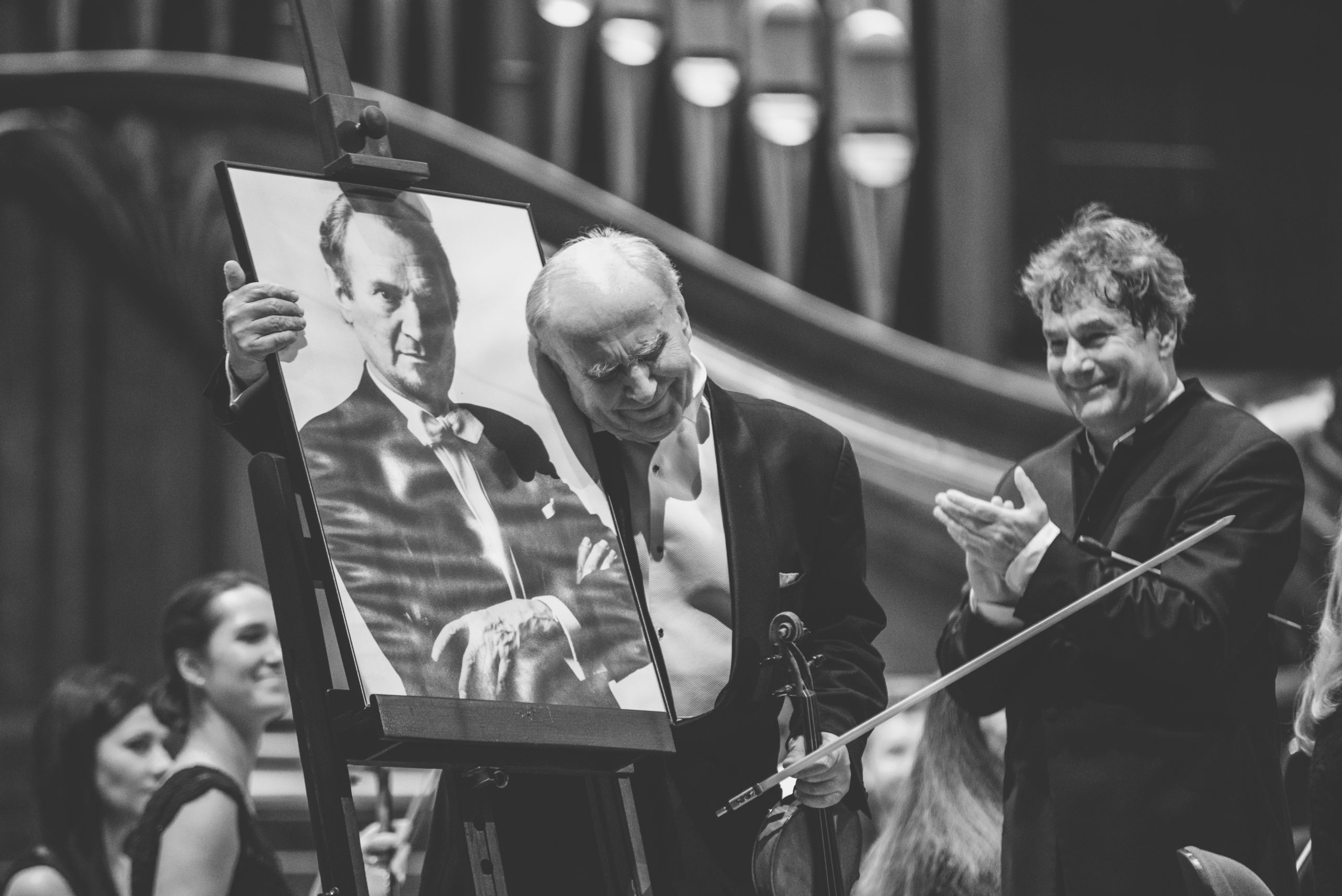
Krzysztof Jakowicz and Mirosław Jacek Błaszczyk at the naming ceremony, Warsaw 2018 / phot. Piotrek Banasik
After the death of the Master on the eve of Christmas Eve 2014, the ensemble paid homage to Jerzy Semkow by performing in the Basilica of the Holy Cross in Warsaw on 22 April 2015, during a Mass for his intention. The concert on the 22nd of October 2016 in the Community Centre in Radomsko – the city he came from and of which he was an honorary citizen – also had a special significance.
Naming ceremony of Polish Sinfonia Iuventus Orchestra
On 8 October 2018, during the concert inaugurating the 11th artistic season of the Polish Sinfonia Iuventus Orchestra, the Minister for Culture and National Heritage named the ensemble after Jerzy Semkow. The ceremony was attended by Colette Semkow, his wife. For years associated with music, she continues the great work of her late husband by actively supporting young musicians (with particular emphasis on Polish artists) in the Jerzy Semkow Foundation.
At the ceremony, for her involvement in the affairs of the Polish music community and the promotion of Polish culture, Colette Semkow was presented with the Honorary Medal of Merit for Polish Culture.
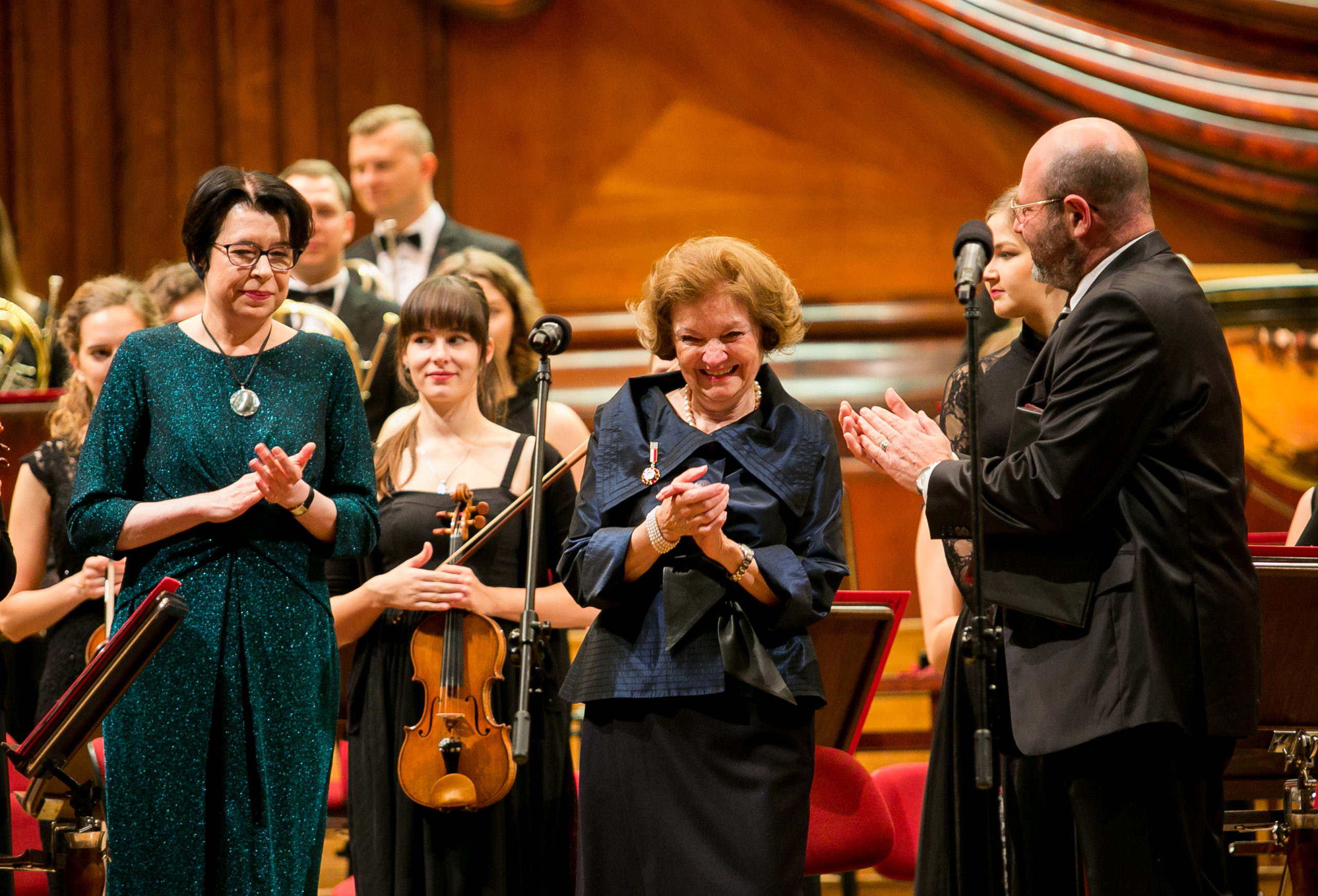
Minister Wanda Zwinogrodzka, Colette Semkow, Piotr Milwiw-Baron at the naming ceremony, Warsaw 2018 / phot. Krzysztof Stepkowski
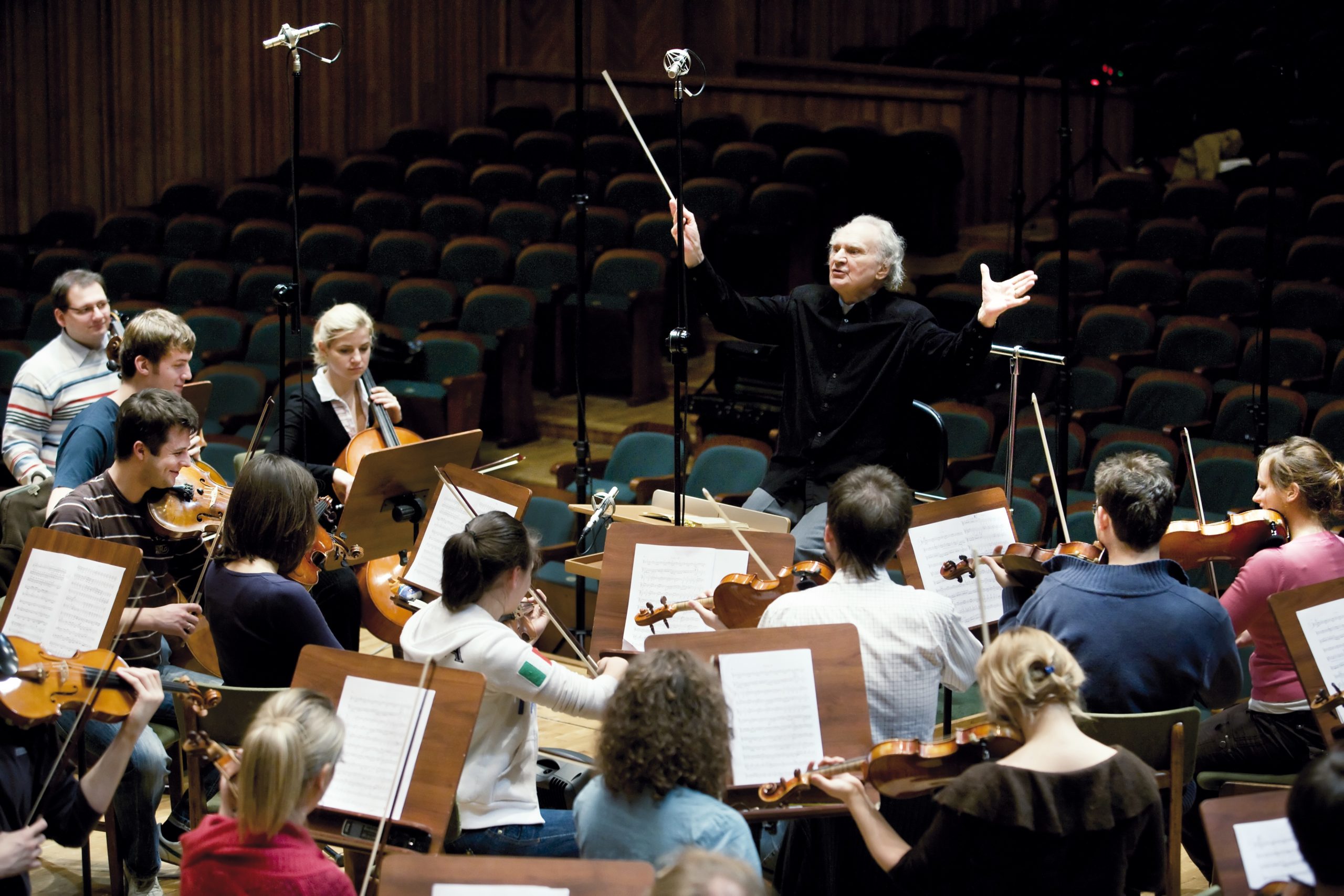
Jerzy Semkow at the recordings with Polish Sinfonia Iuventus Orchestra, Bydgoszcz 2008 / phot. Tadeusz Cytulski
Jerzy Semkow – Biography
Jerzy Semkow – one of the most prominent conductors, orchestra leaders and musical luminaries of the 20th and 21st century, born on 12 October 1928 in Radomsko. From 1946 to 1951 he studied conducting at the State High School of Music in Cracow under the supervision of Artur Malawski. He continued until 1953 at the Leningrad Conservatory with the legendary Yevgeny Mravinsky, whom he then assisted for two years. For the next two years he worked as the conductor in the Bolshoi Theatre in Moscow. In 1958-1961, he led performances at the State Opera in Warsaw (where he also acted in the capacity of Artistic Director). After 1965 he embarked on a brilliant international career, initially as a conductor of the Royal Danish Opera in Copenhagen. Since 1971 he worked, among others, in the USA, with Cleveland Symphony Orchestra, St. Louis Symphony Orchestra, and successfully leading the Rochester Philharmonic Orchestra from 1985 to 1993 serving as an artistic director and first conductor. He also had an Italian episode, leading the Radio and Television Orchestra RAI in Rome during the years 1979-1982. Towards the end of his life he lived in France (he was a citizen of that country) and Switzerland, often conducting as a guest conductor, including in Poland.
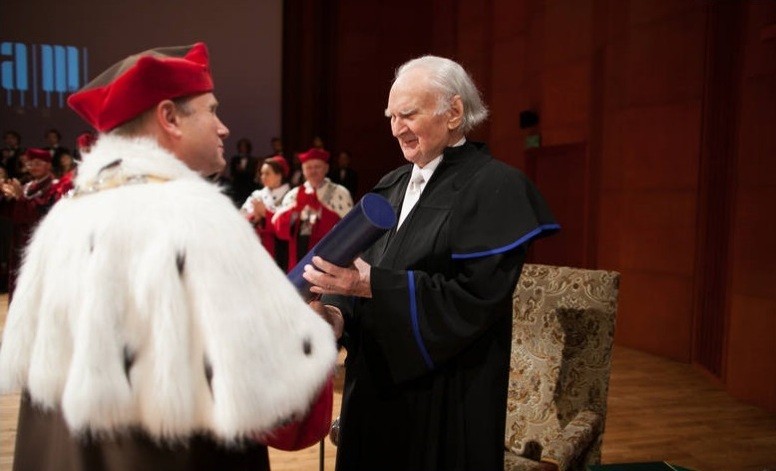
Jerzy Semkow awarded with honoris causa degree at the Academy of Music in Łódź / phot. Maciej Stanik
He recorded for the world’s leading record labels, including Columbia, EMI, His Master’s Voice, as well as Polskie Nagrania. The recording made for EMI, featuring Mussorgsky’s Boris Godunov under his baton with all-star cast of soloists (among others Martti Talvela, Nicolai Gedda, Andrzej Hiolski, Halina Łukomska and Stefania Toczyska), the Great Symphony Orchestra of Polish Radio and the Choir of Polish Radio, became one of the most famous and highest-rated recordings of this opera ever. His performances of the canonical musical compositions – works by Mozart, Beethoven, Brahms, Tchaikovsky, Bruckner and Mahler, were unforgettable. He also devotedly promoted Polish music on stages worldwide, especially concerts by Chopin, Szymanowski, Lutosławski and Penderecki. The impressive list of orchestras with which he performed includes London Philharmonic, Berliner Philharmoniker, Wiener Symphoniker, Israel Philharmonic, Orchestre National de France, Orchestre de Paris, almost all leading US orchestras, as well as several Polish ones, including the National Philharmonic Symphony Orchestra and the National Polish Radio Symphony Orchestra. Adored by public and critically acclaimed, Maestro Semkow was recognised with a number of prestigious awards, distinctions and honours, including the French order Arts et Lettres (2000), as well as honorary degrees from the Academy of Music in Warsaw (2005) and Grażyna and Kiejstut Bacewicz Academy of Music in Łódź (2013). He died in Lausanne, on 23 December 2014. Małgorzata Komorowska dedicated a biographical book to him, titled Jerzy Semkow. Magia batuty [Jerzy Semkow. The Magic of the Baton].
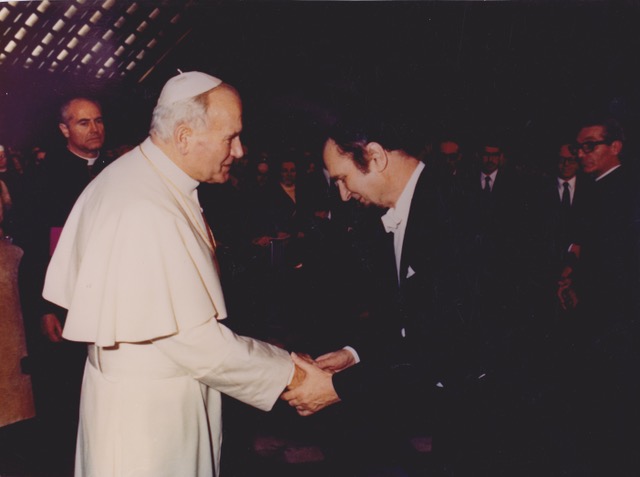
Jerzy Semkow at an audience with Pope John Paul II / phot. Colette Semkow’s archive
Among the numerous memoirs published after the Master’s death, particularly moving were the words dedicated to him by an outstanding pianist, his friend Ewa Osińska: “Music was certainly Jerzy Semkow’s greatest passion and love, he subordinated his life to it; people, in turn, he tried to subordinate to himself. He was undoubtedly an outstanding individual of contemporary conducting world, and as such he will go down in history. […] Jerzy Semkow was a ‘pure’ intellectual, an erudite and an extremely well-read man. He could defend his artistic visions with conviction. He generally spoke in a rather laconic but convincing way. An aesthete on a daily basis, he seemingly never yielded to fashions. A silk scarf around his neck, however, was somewhat an expression of coquetry. Conductor’s hands play an important role in his work. Jerzy Semkow’s hands were tiny, delicate, rarely open, his fingers rather tight. Even at the table, during a meal, their shape did not change much. It seemed that he was still holding the baton. I looked at these hands while playing Robert Schumann’s Piano Concerto in A Minor under his direction, with the Rochester Philharmonic Orchestra in the United States, in a huge hall with 2600 seats. I watched the orchestra take care of their boss, pampering him with treats which stood in the director’s box just in case. Respect, care and admiration for the director were felt at every step. The musicians did not take their eyes off him, and these tributes were received by Maestro very naturally, as if it could not be otherwise”. (“Muzyka w mieście” [“Music in the City”] 2015, no 3). [pmac]
